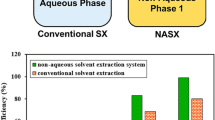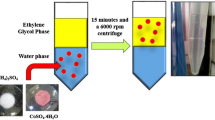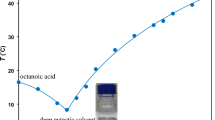Abstract
DURING an investigation of the extractive separation of cadmium and zinc with naphthenic acid1,2 a selectivity reversal has been observed on the changing of the supporting electrolyte anion from sulphate to chloride. This communication reports the results of a preliminary study of the system and comments on the possibility of measurement of formation constants of the inorganic ion association complexes in the aqueous phase by an extractive technique.
This is a preview of subscription content, access via your institution
Access options
Subscribe to this journal
Receive 51 print issues and online access
$199.00 per year
only $3.90 per issue
Buy this article
- Purchase on Springer Link
- Instant access to full article PDF
Prices may be subject to local taxes which are calculated during checkout
Similar content being viewed by others
References
Fletcher, A. W., and Wilson, J. C., I.M.M. Bull., 70, 355 (1961).
Fletcher, A. W., “Improvements in or relating to the Extraction of Metal Values”, Brit. Pat. No. 915, 428 (1960); Brit. Pat. Applic. Nos. 21924/61 and 25443/61.
“Stability Constants, Part II”, Chem. Soc. Spec. Pub. No. 7 (1958).
Diamond, R. M., and Tuck, D. G., Prog. Inorganic Chemistry, Part 2 (Interscience, 1960).
Author information
Authors and Affiliations
Rights and permissions
About this article
Cite this article
FLETT, D. A Selectivity Reversal in Solvent Extraction. Nature 200, 465–466 (1963). https://doi.org/10.1038/200465a0
Issue Date:
DOI: https://doi.org/10.1038/200465a0
This article is cited by
-
Solvent extraction of Cd(II) with isonitrosothiocamphor
Journal of Radioanalytical and Nuclear Chemistry Articles (1984)
Comments
By submitting a comment you agree to abide by our Terms and Community Guidelines. If you find something abusive or that does not comply with our terms or guidelines please flag it as inappropriate.



